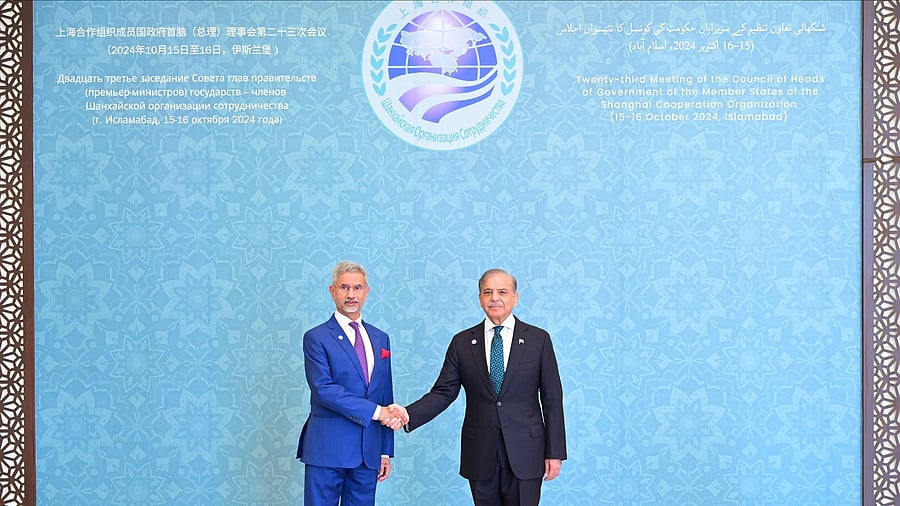
Prime Minister Muhammad Shehbaz Sharif receives S Jaishankar, at the venue of the 23rd Shanghai Cooperation Organisation.
Credit: Reuters photo
Contrary to many expectations, Indian Prime Minister Narendra Modi’s decision to skip the 2024 Head of Government Shanghai Cooperation Organisation (SCO) summit held in Pakistan is not surprising. While an invitation was extended, Modi typically attends the Head of State summits, nominating either the External Affairs Minister or Defence Minister to represent India at the Head of Government meetings. However, India’s decision to hold the 2023 Head of State Summit virtually, combined with Modi’s absence from this July’s Head of State Summit, highlights the SCO’s declining strategic significance for India.
India, along with Pakistan, became a full member of the SCO in 2017. Apart from the grouping’s mandate that underlined cooperation on counter-terrorism and deradicalisation efforts in the region, the forum promised several geopolitical opportunities. First, in the post-Doklam crisis period, the platform was believed to offer a new forum to broaden India-China cooperation. Second, it appealed to India, given Russia did not want the forum to be Beijing-dominated. Third, the SCO offered India a platform to engage Central Asian Republics, which had otherwise proven difficult owing to the constraints of geography. Fourth, despite the suspended India-Pakistan dialogue in the aftermath of the Pathankot terrorist attacks, the forum provided the two countries with a less controversial means to hold talks on the summit’s sidelines. Fifth, with the Afghanistan question burning and still uncertain, it made strategic sense for India to join SCO, given the grouping had all the major stakeholders as members. In this sense, India did not want to be left out of the high table deliberating the Afghan question. Last but not least, by joining SCO, India wished to demonstrate its strategic autonomy and its ability to work with all sides based on interests.
However, the geopolitical landscape has changed considerably since then. There’s little evidence to suggest SCO’s effectiveness in curbing terror in India. New Delhi’s priorities on cross-border terrorism contrast sharply with those of China and Pakistan. In fact, any time India has moved a UN resolution to designate Pakistan-based terror handlers, Beijing has put a technical hold at Islamabad’s behest despite overwhelming evidence to the contrary. This has often limited and compromised the SCO’s mandate.
Further, not only have India-China ties deteriorated to their worst in decades since the Galwan clashes in 2020, but a deeper strategic alignment has emerged between China and Russia since the latter’s invasion of Ukraine in 2022. Moreover, Russia’s dwindling strategic autonomy vis-à-vis China in light of its increasing economic dependence on the latter renders SCO into an increasingly China-dominated forum.
In so far as India-Pakistan ties are concerned, the absence of dialogue is not a function of the lack of platform but of intent. In fact, when required, for instance, in concluding the 2021 ceasefire agreement, the two countries have chosen to talk bilaterally. The SCO has also significantly underperformed in facilitating any progress on trade and connectivity between India and Central Asia.
Lastly, the membership of a grouping that is overtly anti-Western and engages in anti-US rhetoric has created challenges for India. At a time when India’s developmental and security goals align more closely with the US and the West than with SCO countries, its presence at the forum is bound to create diplomatic challenges. Perhaps this explains India’s decision not to hold an in-person summit last year and for the PM to skip the one earlier this July.
India seems well aware of the shortcomings of its association with the SCO. Nevertheless, India’s presence there offers opportunities to score some diplomatic points. Since the Taliban’s takeover of Afghanistan in August 2021, the SCO remains one of the only multilateral forums to engage with the country, especially given the absence of any bilateral mechanisms. India’s continued objection to the China-Pakistan Economic Corridor (CPEC) and the Belt and Road Initiative (BRI) on a Beijing-led forum certainly leaves China embarrassed. Besides, it also allows New Delhi to highlight Beijing’s duplicity vis-à-vis serious security challenges in the neighbourhood. China is often referred to as a disrupter in international forums, especially with respect to Indian or Western-led initiatives. It wouldn’t be unfair for India to return the favour.
(Amit Kumar is a Staff Research Analyst and Vanshika Saraf is a Research Analyst, Takshashila Institution)